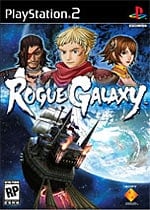Probably the last great RPG hurrah for the PS2
Of all of the current generation consoles, the PlayStation 2 has held on the longest, which is quite a feat since it was also first. Microsoft has all but abandoned the Xbox with the release of the 360, and the Nintendo has thrown itself behind the Wii and the DS wholeheartedly. While all three systems are diminishing in the shadow of their replacements, the PS2 continues to show that it isn’t ready to lie down and die just yet. Rogue Galaxy, an RPG from the creative minds behind Dark Cloud 2, may be the PS2’s last great RPG and a fitting tribute to the great but fading PS2.
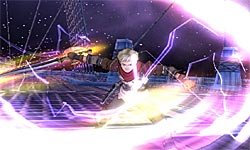
Rogue Galaxy is the story of Jaster Rogue, an aspiring space pirate stranded on a dead-end desert planet. An intergalactic war prevents traveling off-planet, so young Jaster wishes for a way to get around his planetary grounding. Fortunately, Jaster encounters a legendary bounty hunter, Desert Claw, who aids him in banishing some enemies. Jaster runs into a duo searching for the bounty hunter shortly after losing sight of his mysterious ally. They mistakenly believe that Jaster is Desert Claw, and they recruit him to aid them in their quest. This sets up the story, allowing Jaster to escape his home planet and begin adventuring with the space pirate crew in an epic story that will span five planets.
The visuals in Rogue Galaxy are beautiful. Level-5 has been known for their proficiency with cel-shading, as seen in their titles Dark Cloud 2, Dragon Quest XIII, and the cancelled True Fantasy Live Online. Rogue Galaxy seems to be the culmination of all their experience in crafting a gorgeous game world with hand drawn animations and colorful and vibrant environments.
The audio in Rogue Galaxy is great as well, with an enjoyable soundtrack and great and believable voice acting. One potentially annoying application of the voice acting, however, is in the Live Talk option of the gameplay. Live Talk allows the party members to offer comments and suggestions throughout the exploration part of the game. Most of these comments are simple statements about the party’s current circumstances. Although these comments are usually situational, the areas are so big that the players will hear each individual comment repeated multiple times, which can get tiresome quickly. Fortunately, this option can be turned off.
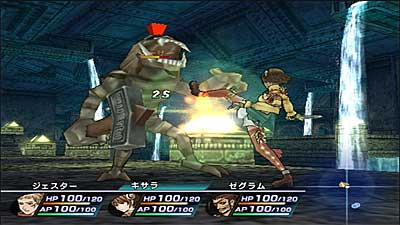
Rogue Galaxy, although classified as an action RPG, does a number of things differently from most games in this genre. The first and most prominent is their use of combat. While there are still random encounters, there is no shift to a battlefield. Instead, a warning appears on the screen moments before the enemies emerge, and the battle takes place in the exploration screen. This can be both a blessing and a curse. With no shift to a battlefield, the player stays immersed in the game, but the ensuing combat feels odd in some locations. If there are NPCs nearby, they disappears as the enemies and obstacles fade in. When combat is over, the objects fade out and the NPCs fade back in, making the combat seem almost dreamlike and unrealistic at times. Also, even though there isn’t an area shift with enemy encounters, the system is still random encounter based, making travel a stop-and-go affair.
The combat is real time, allowing the player to attack instantly. The player can have a team of up to three characters and each character in the game controls differently, with varying speeds, power levels, and abilities. Jaster is the simplest to use, with a sword as his main weapon and a gun as his subweapon. Lilika, a later addition to the roster, has a chargeable bow and arrows as her main weapon and a hatchet as her subweapon, reversing Jaster’s range preferences. This ensures that combat feels different from character to character. Also, there are a number of things in place to ensure that the gameplay doesn’t devolve into the boring button-mashing sessions that some action-RPGs can become. One example is an occasional battle challenge, like defeating all foes in a certain amount of time or winning the battle without losing any HP. Another example is foes that cannot be defeated by conventional means, and must be tackled by different methods such as hitting them with a charged attack to break their shields or jumping on their heads to expose their vulnerable area. Jaster and crew also have a meter that depletes with each attack, and prevents the player from attacking when the gauge is completely empty. The character must then wait until the meter is refilled or can successfully block an attack to instantly fill the meter. All of these options work together to keep the combat fresh and intense throughout the game.
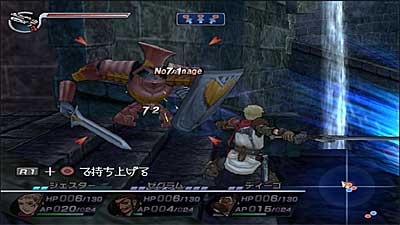
In addition to these innovations, there is also the Battle Suggestion system. Your teammates will sometimes wish to use techniques or items while fighting alongside you, but will ask your lead character for permission before doing so. If you agree, a simple press of the corresponding trigger button gives your consent, while ignoring them or pressing L3 will veto their suggestion. This allows the player to control the use of items and abilities during the real-time combat. Unfortunately, your allies aren’t always wise when it comes to the use of their powers and items, since you’ll often have one foe on his last legs and still have allies clamoring to waste stat buffs that will only last the second that it takes to defeat the last foe.
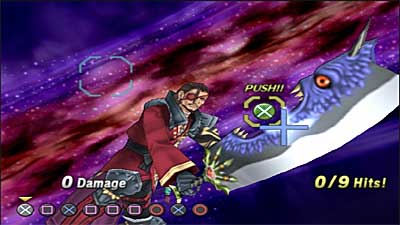
Much like Level-5’s previous works, Rogue Galaxy makes extensive use of items and weapons, both found in exploration and earned in combat. Beyond their normal utility, players can fuse weapons to create more powerful weapons, plug items into their Revelation Flow chart to gain abilities, and even utilize a factory earned later in the game to create new items. Some items can even be used to catch and feed Insectors, the game’s tiny version of Pokemon. There are a staggering number of possible items and weapons in the game, with a large number of these only attainable through experimentation with the factory and the fusing, which makes the search for and rationing of items a huge and rewarding part of gameplay.
